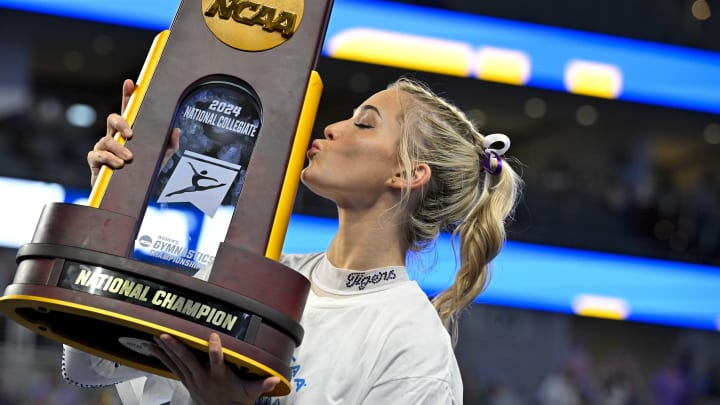Olivia Dunne’s Mom Criticizes Proposed NCAA NIL Disclosure System

Olivia Dunne is amongst the most prolific athletes of the NIL era. With remarkable social media acumen, the LSU gymnast leveraged her influencer fame to earn multi-million dollar payouts. Endorsement deals with high-profile brands like Vuori, American Eagle, Body Armour, and many more have broadened her fame and deepened her pockets. In the wake of massive upheaval in collegiate athletics, the NIL poster child’s mother has taken to social media to express displeasure with proposed rule changes that would require all athletes to disclose NIL endorsements that are over $600 in value.
This week, a long-form draft of a proposed settlement in the House v. NCAA case was released. It included language that, if approved by Judge Claudia Wilken, would enshrine a regime in which the NCAA could review NIL contracts with a value over $600 to ensure fair market value.
NIL is about giving athletes the same rights as every other student on campus to their own name image and likeness. Unless everyone needs to report payments over $600 for approval this is incredibly unfair. The market determines nil value not a third party.
— Katherine Dunne (@4katdunne) July 26, 2024
Outside of the burden of filing a report to the NCAA, these rules are unlikely to impact Livvy’s personal finances in any tangible way. All of Dunne’s NIL engagements are brand deals with corporations who aim to leverage her influence for marketing purposes –– it would be challenging for any third party audit to reveal that those activations violate any conceived notion of fair market value. However, this experience may not be shared by Dunne’s revenue athlete peers at LSU and beyond.
The proposed language in the House v. NCAA settlement is not aimed at curtailing the NIL activations of bonafide influencers but rather at stopping the now ubiquitous practice of NIL Collectives, which act as a funnel to get booster dollars to athletes to compensate them for on-field performance. Virtually all division one schools have partnered with a NIL Collective. These instiutions act as third-party shell corporations that solicit funding from devout alumni to create token NIL engagements for athletes, usually in the form of social media posts. These NIL engagements act as a facade for the actual purpose of the payments –– athlete recruitment and retention.
According to further language in the settlement proposal, the NCAA and its member conferences can create rules that restrict “Boosters (individually or collectively) of a Member Institution from entering into NIL licenses with or for the benefit of current or prospective student-athletes at a given Member Institution unless the license/payment is for a valid business purpose related to the promotion or endorsement of goods or services provided to the general public for profit, with compensation at rates and terms commensurate with compensation paid to similarly situated individuals with comparable NIL value who are not current or prospective student-athletes at the Member Institution.”
At a major athletic powerhouse like LSU, NIL Collectives can pay athletes tens of millions of dollars annually. These collective deals are predominantly reserved for men’s basketball and football players; however, a few elite non-revenue athletes have reported signing similar deals.
While Olivia Dunne’s endorsement portfolio is likely not in danger of a third-party audit, her own NIL arm, the Livvy Fund, may be jeopardized. The Livvy Fund, an extension of LSU’s NIL Collective, Bayou Traditions, aims to provide meaningful NIL opportunities to women collegiate athletes who are often overlooked in NIL collective deals. Dunne started the fund out of gratefulness for her current stardom, “as a female student-athlete, I have been fortunate enough to build a strong social media following and establish valuable brand partnerships that have launched my career in ways I couldn’t imagine. I am excited to build on this momentum by leveraging my connections and sharing my knowledge in the NIL space to create more opportunities for LSU female-student athletes, while emphasizing the importance of bringing NIL funds to women in college sports.”
If NCAA backed NIL auditing becomes a reality, NIL collective payments would be expected to face harsh scrutiny. Most NIL deals are structured as retainer contracts with athletes on the hook for various NIL responsibilities throughout the year. Jake Rubin, a marketing consultant with experience in athlete influencer campaigns, attests that when a brand is looking to sign an athlete for a true marketing activation, not a pay-for-play scheme, finding a range is easy, but not always precise: “Social media engagements are calculable. When entering a negotiation, there is often a target figure and a buffer on both sides of the number; the size of the buffer is dynamic based on how big the budget is.”
Rubin states that sometimes two parties may have differing interpretations of what an athlete is worth, “I could tell you what I think their value is, but they might feel their value is higher or even lower than my assessment. However, we all use the same tools to determine those factors.” What NIL valuation calculations the NCAA auditing arm will choose to use is still indeterminant; traditionally, the biggest factor in influencer pricing is follower count, but to Rubin, that is not the full picture; “Some of the main factors you look for in influencers besides their follower count is their engagement rates, you can have all the followers in the world, but if they aren’t engaging with your content it doesn’t mean much. Is their content authentic or is the influencer just putting out standard branded content.”
Athletes often have many NIL engagements outlined within their collective contract, including event appearances, social media posts, autographs, etc. With no sure-fire way to calculate influencer value, the NCAA has a challenging road ahead of them in articulating narrow fair market value ranges for such dense agreements. Basketball players like Washington’s Great Osobor and Kansas State’s Coleman Hawkins, who have recently signed record-breaking $2,000,000 annual NIL deals, have payouts that are so high that they are likely in the NCAA's cross-hairs. However, student-athletes with lower collective payouts and more annual NIL obligations may have ammunition to contest that their collective payments are fair market value for the services they bring to the table in marketing efforts for the collective.
Beyond the logistical challenge of implementing NIL auditing practices, a legal challenge is also on the horizon. The NCAA is a notorious loser in antitrust challenges, and this regulation would no doubt place a cap on what student-athletes can earn, triggering anticompetitive concerns. With relative certainty, if the settlement proposal is approved as written, someone would challenge the loss of NIL collective earnings in court. Based upon the posture of other ongoing antitrust litigation regarding NIL enforcement, the NCAA does not seem poised to take on such a challenge.
